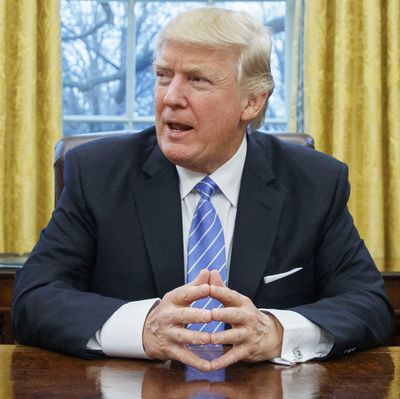
Donald Trump hates the status quo system of global trade, multilateral institutions, and constraints on his authority.
Thus, the World Trade Organization (WTO) — a multilateral institution that structures global trade by constraining the authority of nation-states — is a natural nemesis for the economic-nationalist-in-chief.
The president has already made a practice of subverting the WTO. His tariffs on steel and aluminum required abusing the “national security” exemption to the organization’s rules — Trump had to claim that cheap Canadian and European metal represented a dire threat to the American homeland. Europe has (understandably) moved to challenge Trump’s case before the WTO, where it is almost certain to win.
The president likely had such liabilities in mind when he ordered staffers this spring to prepare draft legislation that would (essentially) nullify the WTO’s rules. White House advisers briefed Trump on the resulting “United States Fair and Reciprocal Tariff Act” in late May. Axios briefed the public on a leaked a version of that documented Sunday night; and many, many Twitter users proceeded to “brief” each other on the fact that the White House had named its bill the “U.S. FART Act.”
To be fair, the legislation would certainly create a big stink. The FART Act would give President Trump unilateral authority to impose tariffs (of unlimited size) on any foreign nation, for any earthly reason. The bill would not formally withdraw the United States from the WTO, but it would effectively do so, by nullifying two of the organization’s core rules:
(1) the “Most Favored Nation” principle, which bars WTO members from setting disparate tariff rates on different countries outside of formal trade agreements
(2) the ceiling on tariff rates that were established in previous WTO negotiations
Were Congress to pass this measure — and the White House, to subsequently make trade policy on an ad hoc, country by country, product by product basis — the global economy would be wracked by turmoil. The law would potentially allow the White House to establish “tens of thousands of new tariff rates on products.”
Fortunately, all signs suggest that the FART Act is just a bunch of hot air. There is an approximately zero percent change that Congress would ever pass such a measure. For all the talk of Trump “transforming” the Republican Party, it remains the case that his signature immigration legislation — which would have upset a variety of business interests, by cutting legal immigration in half — failed to garner more than 38 GOP votes in the Senate. And the WTO bill would, of course, threaten corporate America far more than Trump’s immigration ambitions ever did. Anyhow, according to Axios, the White House has done essentially nothing to advance the legislation since it was drafted in late May.
Commerce Secretary Wilbur Ross tried to reassure markets of that latter point Monday morning, telling CNBC that the “WTO knows some reforms are needed. So I think there really is a need to update and synchronize its activities, and we’ll see where that leads. But I think it’s a little premature to talk about simply withdrawing from it.”
And yet, at some point, the WTO is almost certain to veto the trade moves that Trump has already made. When that happens, there’s good reason to think that the president might force his congressional allies into a bitter, intra-party fight, by letting his FART loose — no matter how foul it smells to all but himself.






























